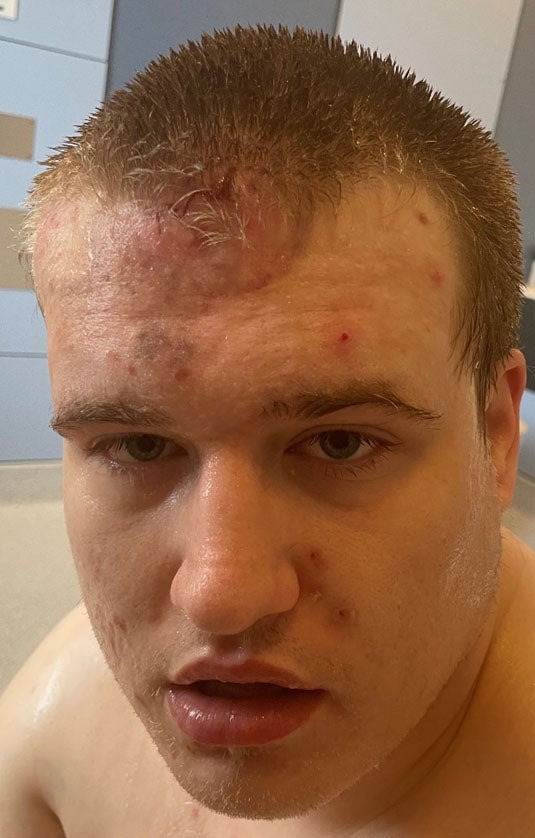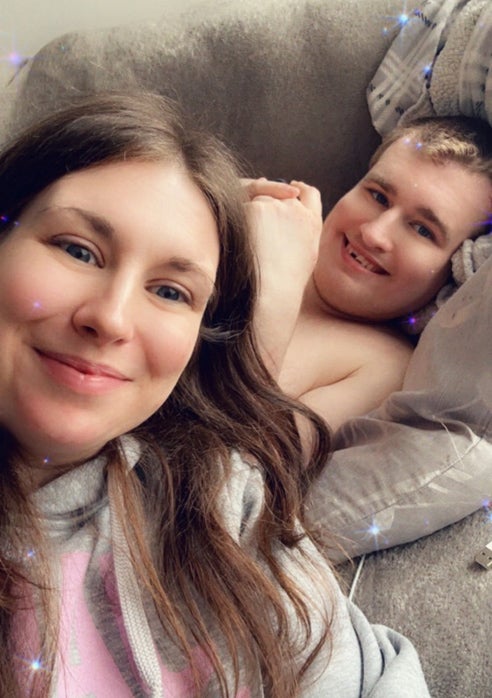My name is Rebecca Davis. Many people know me as I’ve campaigned to get my brother Elliot, who was held under Section 3 of the Mental Health Act from April 2018, released back into the
community
 A community is the people and places in an area.
.
A community is the people and places in an area.
.
Elliot has
autism
 Autism is a disability. Autistic people find it difficult to understand what other people think and feel. They also find it difficult to tell people what they think and feel. Everyone with autism is different.
, a moderate
learning disability
Autism is a disability. Autistic people find it difficult to understand what other people think and feel. They also find it difficult to tell people what they think and feel. Everyone with autism is different.
, a moderate
learning disability
 A learning disability is to do with the way someone's brain works. It makes it harder for someone to learn, understand or do things.
and epilepsy. Before being sectioned, he lived at home with his family and had a Personal Health Care
Budget
A learning disability is to do with the way someone's brain works. It makes it harder for someone to learn, understand or do things.
and epilepsy. Before being sectioned, he lived at home with his family and had a Personal Health Care
Budget
 A budget is a plan where you look at how much money you have and how you will spend it.
with a small number of staff supporting him. Elliot was sectioned due to a sudden change in his mental health, and we were worried he was going to harm himself significantly.
A budget is a plan where you look at how much money you have and how you will spend it.
with a small number of staff supporting him. Elliot was sectioned due to a sudden change in his mental health, and we were worried he was going to harm himself significantly.
The institution he went into was known as an
assessment
 An assessment is a way of finding out what help a person needs. When you have an assessment, you might have to go to a meeting or fill in a form.
and treatment unit, designed to be a short-term secure placement for people with a learning disability to receive treatment before moving back into the community.
An assessment is a way of finding out what help a person needs. When you have an assessment, you might have to go to a meeting or fill in a form.
and treatment unit, designed to be a short-term secure placement for people with a learning disability to receive treatment before moving back into the community.
However, they are controversial, and people can live in them for years. Elliot was one of them. When I made the call for help, I was told Elliot would receive the support he needed, and he would be home within a few weeks. I honestly didn’t think it would turn into a four-year battle.
The last few years have been incredibly difficult for everyone but particularly for Elliot. Seeing him in hospital, being restricted on what he was able to do and how he was deteriorating, was traumatic for him and for us as a family.
He suffered terrible injuries; a fractured shoulder, unexplained broken teeth, and was deliberately hurt and tormented by a staff member. Untrained staff used restraint techniques they shouldn’t have, resulting in him face-planting into the floor and causing facial injuries.

While all this harm was physical, it's the mental trauma I see him living with is even more heart-breaking. Basic care was often neglected, as care plans and behavioural support plans weren’t followed. Any information or advice we offered as a family to prevent meltdowns and unnecessary agitation to Elliot was ignored. The high levels of seclusion and overuse of medication has also left a negative impact on Elliot, and I believe he is now reliant on certain medications that he doesn’t need.
I put my trust in the NHS to provide Elliot with a high level of care, understanding and respect. But he was failed. I often say on my social media, I wish I never picked up the phone and say to others, “Don’t do it. You lose all control, they don’t listen, they try to exclude you, it turns into power over support, and they are traumatised.”
While Elliot does have complex needs, nobody deserves to be treated the way he was. Unfortunately, Elliot’s situation is not unique. Figures show around 2000 people were detained in mental health units like Elliot’s. Despite previous pledges to reduce the number of autistic people and those with a learning disability being detained, far too many continue to be locked away, often because there isn’t the proper support in the community.

Elliot is now living in his own home with a provider supporting him 24/7. Elliot is happy and his smile is now a genuine one which makes me feel amazing. We still have a long way to go but we have made a real positive start. He comes to my house often and is free.
The best place for Elliot is to be surrounded by people with real understanding, empathy and who want the best for him. He’s no longer over-medicated and hands-on restraint is almost zero. We are proud and I will continue to campaign for others to live just like Elliot, in homes not hospitals and supported by the right people.
Help more people live in homes, not hospitals - write to your MP and end this national scandal.

 By Mencap
By Mencap